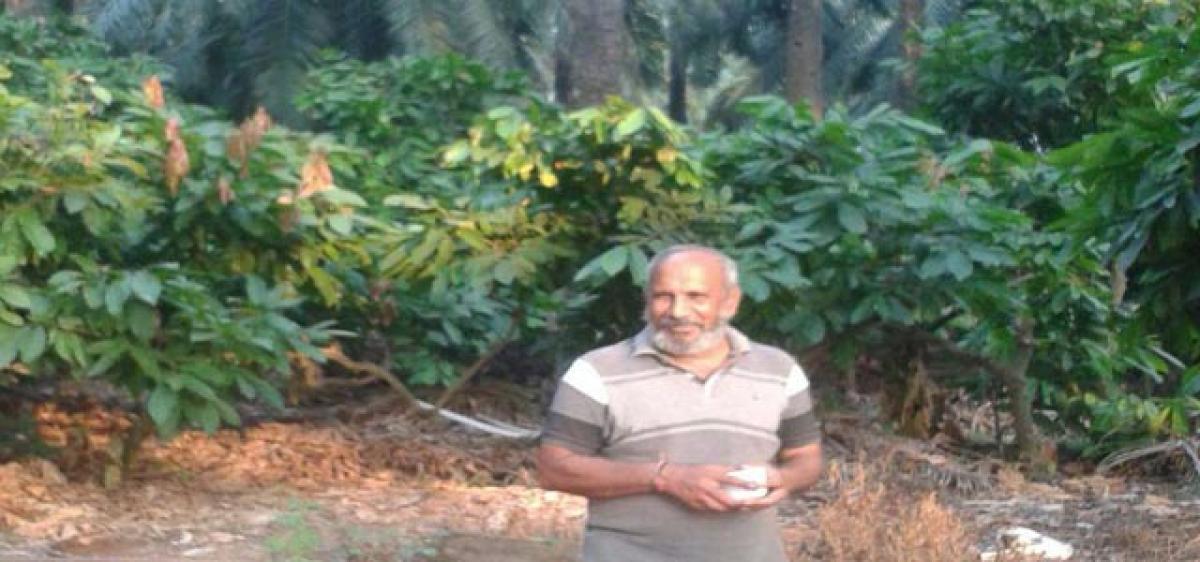Live
- Allu Arjun Arrested: KTR Reacts on X, Calls Arrest Unfair
- Bold steps by Modi govt in reviving Indian heritage, culture: Union Minister
- What are the charges against Allu Arjun: Understanding the Charges Against Him
- Allu Arjun Objects to Arrest Procedure, Requests Breakfast and Change of Clothes
- ‘Fear’ movie review: A gripping suspense thriller
- Phenom Successfully Hosts IAMPHENOM India, Transforming the Future of Work with AI, Automation, and Talent Experience
- Constitution provides shied, guarantee to Indians: Priyanka in LS
- Allu Arjun’s Quash Petition Hearing at 2:30 PM; Chiranjeevi Visits Police Station
- Bommai hails 'One Nation, One Election' move as PM Modi’s bold decision
- Telangana IT Minister D. Sridhar Babu Highlights Future City Vision and Data Center Growth at IAMPHENOM Event
Just In

A mechanical engineer from West Godavari district took to agriculture at a time when the scores of farmers were desperately trying to give up cultivation and looking for alternatives.
Prasad has made agriculture viable by raising oil palm plantations with cocoa and coconut as inter-crops through organic farming and rain harvesting technology. He set an example for others by making agriculture more profitable with a zero-budget concept
Vijayawada: A mechanical engineer from West Godavari district took to agriculture at a time when the scores of farmers were desperately trying to give up cultivation and looking for alternatives. Guduru Sivaramprasad, a 50-year old engineer, who was working in a construction company in Madhya Pradesh, gave up his cozy position with an assured monthly income, to up agriculture.
The engineer-turned farmer from Tadikalapudi has a passion for organic cultivation. Prasad has made agriculture viable by raising oil palm plantations with cocoa and coconut as inter-crops through organic farming and rain harvesting technology. He set an example for others by making agriculture more profitable with a zero-budget concept.
A staunch believer in Subhash Palekar’s natural farming, Prasad has a herd of buffalos and cows of superior traits which feed on grass in his fields. The manure produced by the cattle is used for horticulture crops, which facilitates zero-budget farming. In addition, milk produced by the animals fetches him additional income.
“It is a humble beginning in a journey in agriculture towards zero-budget, meaning zero spending on chemical fertilizers”, Prasad says. He reasoned that agriculture has become unviable leading to distress conditions in farming community in view of heavy dependence on application of chemical fertilizers.
Investments on chemical fertilizers was leading to a spurt in cultivation costs, Prasad pointed out and added that he had been adopting water budget also in horticulture cultivation with rain harvesting technology. According to him one bore-well is sufficient for every 10 acres. Watering the fields on a regular basis keeps micro organisms alive and drip is a dependable source to achieve the objective..
Prasad who hails from Gannavaram in Krishna district, has moved to his in-laws place to try his hand in agriculture on his 25-acre land at Tadikalapudi. He switched over to zero budget natural farming and dwelt on five aspects to cultivate profits. His brief farming experience equipped him with knowledge about bore-wells, tractors, fertilizers and/pesticides, labour and marketing. Ten percent in his total outgo in cultivation is spent towards harnessing water by way of investing on bore wells.
In order to cut down on cost of farming, he used a mini tractor. This helped him save up to Rs 4 lakh. He translated the concept of rain harvesting technology into practice. ater harvesting pits were filled with coconut fibre so that water can be absorbed in the pit and can remain with the fibre for a long time. This technique helps water absorption in the root zone of the plantations, which is a lifeline for any crop.
Prasad believes future lies in agriculture. He thinks water management is the key to success in farming. He never treated cattle rearing different from farming. Both are inseparable, he says. Prasad uses grass and papaya cultivated in the farm itself as fodder for the cattle. He recycles cattle urine and uses it to wet the fodder. As he reuses water, not a single drop of it goes waste.
Prasad uses one hp pump for watering an acre of land, while other farmers use 5 hp pump he uses one hp for the same area of land. Prasad is very keen to disseminate his experience to fellow-farmers in order to help the country achieve food security to feed the multiplying populations.
By Noor Shaik

© 2024 Hyderabad Media House Limited/The Hans India. All rights reserved. Powered by hocalwire.com







